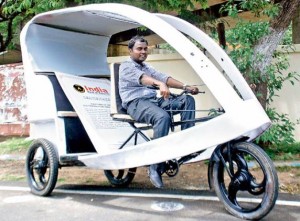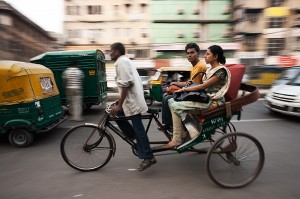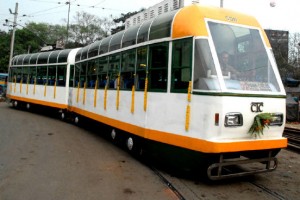Eco-travel does not necessarily just limit to tourism. When you go from point A to B within the city, the way you travel and the mode of transport you choose can really make a difference. Our eco-travel writer Shilpi, looks at an innovative new eco-friendly travelling option available in India and few of the old ideas that have resurrected themselves as the chic new environment-friendly means of transportations.
 Eco-cab – Cab of the future
Eco-cab – Cab of the future
In a world where environmentalists are struggling everyday to bring forth solutions that conserve natural resources, Sivaraj Muthukumaran, an MBA from Tirupur has taken a huge pioneering step. This brilliant 26 year old has designed an eco friendly cab that can be battery operated or even run manually.
The eco friendly cab is actually a modified cycle rickshaw. It is fitted with two batteries, the kinds that are used for cars and solar panels inside it are linked to the batteries.
There are three ways to run this innovative contraption,
- It can utilize solar energy to charge the batteries.
- It can be charged using a wall socket
- or one can pedal it manually.
Pedaling will generate mechanical energy which can be then saved to the battery. The maximum speed that it can achieve is 55 kilometers per hour.
The eco-cab does not emit smoke. It weighs less than 120 kilograms and is easy to operate and maintain. The best thing is that it is environment friendly and will be available at subsidized costs or free.
Sivaraj’s Eco-cab, the first of its kind has already won a place in the Indian Book of Records. (IBR) The patents are in work and if everything goes well, this will easily become the most preferred mode of transport for short distances on the streets of Chennai. To start with, Sivaraj wants it to run from Madhya Kailash to Tidel Park and Anna Nagar.
In 2010, when the Eco-cab was officially launched, it did not gain popularity on account of the speed limitations; 55kmph. But now since the registration of the Eco-cab at the regional transport office will not be required and the cost of this vehicle will be lower than the regular rickshaws, it has generated a lot of interest and found favor with the auto drivers.
Today, like Sivaraj, many people realize the importance of alternate and renewable sources of energy and are leading movement towards green transport which has low impact on environment. Besides lowering the burden on non–renewable resources, green transport also helps in reducing air pollution by using transport systems that have zero emissions.
 Cycle Rikshaw – Classic in a Green avatar
Cycle Rikshaw – Classic in a Green avatar
Another notable effort in support of green transport is the Cycle rickshaw re-introduction. The age old cycle rickshaw now has a new lighter avatar and is now called the eco-friendly rickshaws or eco-cabs.
Fazilka, a border town in Punjab conceptualized the idea for these eco-rickshaws and now more than 1000 such vehicles are in action on the streets of Patiala, Amritsar and a few other districts. In some of these places, Call-a-rickshaw facility is also available. Besides being eco-friendly, this project has successfully generated employment too and now Punjab, Haryana and Chandigarh Governments have been directed by the High Court to adopt this Project.
In national capital New Delhi, post the launch of Metro rails, the cycle rikshaws gained popularity as a quick mode of transport from the stations till homes and vice-versa for the commuters.
 Tram Travel
Tram Travel
The Institute of Urban Transport had undertaken a study on the Kolkata Trams which revealed that tramways are a cheaper and environmental friendly means of transport. And so Tramway re-introduction in metropolitan cities is now under consideration.
Tramcars run on electricity on a fixed path. They are pollution free as compared to the alternative of buses. There are plans to revive the trams in cities like Delhi and Mumbai where they were already in operation years ago.
More Related Stories,
Supreme Court Bans Tiger Tourism
Tips for an Eco-Conscious Traveler






2 thoughts on “An Eco-Cab and other Eco-friendly ways to Travel”